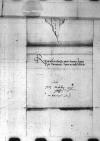List #5708
Sigismund I Jagiellon do Ioannes DANTISCUSCracow, 1542-12-07
| odebrano Heilsberg (Lidzbark Warmiński), 1542-12-16 Rękopiśmienne podstawy źródłowe:
Pomocnicze podstawy źródłowe:
| ||||||||||
Tekst + aparat krytyczny + komentarzZwykły tekstTekst + komentarzTekst + aparat krytyczny
 BNW, BOZ, 953, f. 221r Reverendo in Christo Patri, domino
BNW, BOZ, 953, f. 221r Reverendo in Christo Patri, domino
Reverende in Christo Pater, sincere nobis dilecte.
Perfertur ad nos in
Dat(ae) or Dat(um)⌈Dat(ae)Dat(ae) or Dat(um)⌉
Ad mandatum proprium regiae maiestatis

